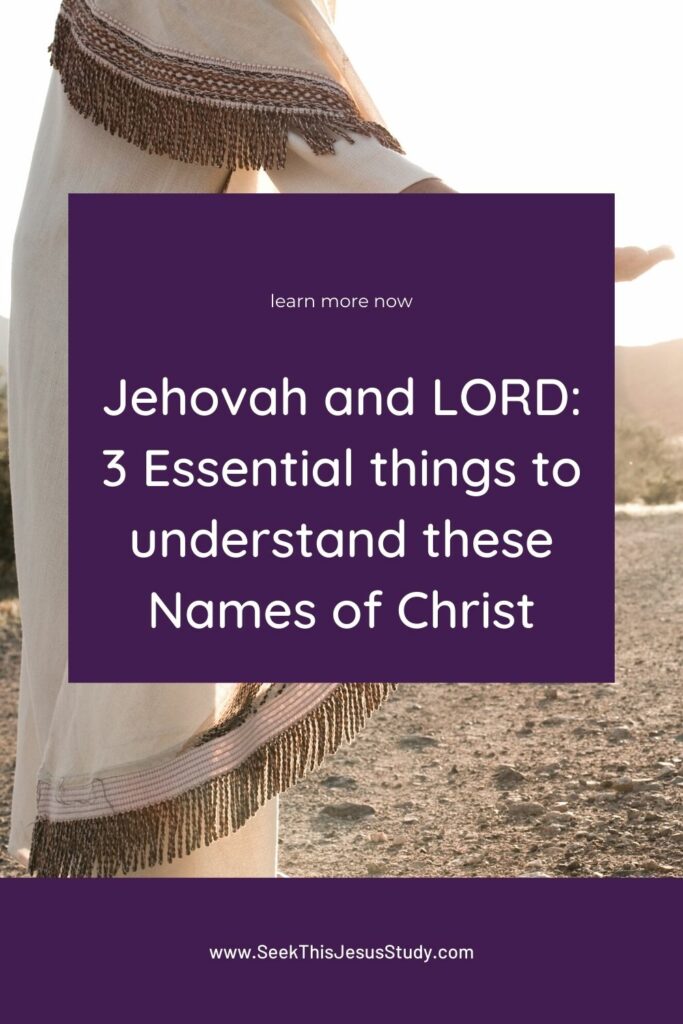
Keeping Christ in Easter: 40 Simple Scripture Cards for a Meaningful Easter Season
Let’s make Easter more of a season What if Easter wasn’t just one Sunday or one week… but a season? We celebrate Christmas for weeks.

I have heard family, friends, and church members comment that it is so hard to find Jehovah (the pre-mortal name of Jesus Christ–the name of Jesus before He was born as a tiny baby) in the Old Testament.
The name Jehovah is only found seven times in the KJV, and that is being generous because three times Jehovah was used with other words to name a place (ex. Jehovah-jireh in Genesis 22:14).

“The Living Christ: The Testimony of the Apostles’ says,
“He was the Great Jehovah of the Old Testament”.
That men may know that thou, whose name alone is JEHOVAH, art the most high over all the earth.
Psalm 83:18
“And I appeared unto Abraham, unto Isaac, and unto Jacob, by the name of God Almighty, but by my name JEHOVAH was I not known to them.
Exodus 6:3
The Guide to the Scriptures, in the Gospel Library App defines Jehovah as “the covenant or proper name of the God of Israel. It denotes ‘the eternal I AM’”.
Did you know that LORD, a name of Christ, appears in the King James Version (KJV) of the Old Testament over 5000 times? That is a lot! So Jehovah is really spoken of, by name, all over the Old Testament.
There is a great article in the June 2002 Ensign magazine, “LORD=Jehovah” by Keith H. Meservy that is very informative. You can check it out here.
Behold, God is my salvation; I will trust, and not be afraid: for the Lord JEHOVAH is my strength and my song; he also is become my salvation.
Isaiah 12:2

Trust ye in the Lord for ever: for in the Lord JEHOVAH is everlasting strength.
Isaiah 26:4
{DISCLAIMER:} Affiliate Links may be used in this post of which I may receive a small commission. The price does not change for you. I only recommend products and tools I use or would use myself.

A 1-page devotional sheet FREE for you in two styles!

I will send you regular emails to help you love your gospel study. No spam! Promise!
Your downloads will be in you INBOX in the next few minutes–please check your SPAM folder if you don’t see it–sometimes they go there since this is my first time emailing you.



Let’s make Easter more of a season What if Easter wasn’t just one Sunday or one week… but a season? We celebrate Christmas for weeks.

Your patriarchal blessing is one of the most personal gifts you will ever receive. For members of The Church of Jesus Christ of Latter-day Saints,

Struggling to Understand the Bible? You Are Not Alone As we prepare to study the Old Testament with Come, Follow Me, many women are asking

What if your scripture study could fit into your real life even in the messy, meaningful, motherhood moments? That’s exactly what we explored in this

“Be Thou My Vision”: A Story of Overcoming Illness with Faith Faith is more than just believing in the good times. It’s about trusting in

God’s Kindness in the Mess Life doesn’t have to be perfect for God to show up. That’s the message Michelle Cox gently reminds us of









Identify your learning styles and find joy in your scripture study
Thank you for joining my email list! I can’t wait to spoil you and promise to keep your email address private

Keep all your materials together and easy to find and use each week as you study.
I will send you regular emails designed to help you love your gospel study. No spam. Promise.